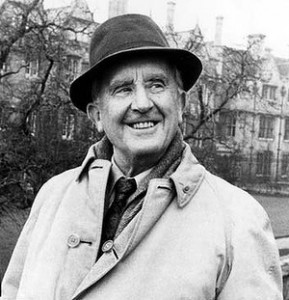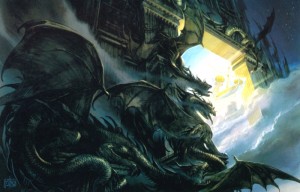Passage #8
We should look at green again, and be startled anew (but not blinded) by blue and yellow and red. We should meet the centaur and the dragon, and then perhaps suddenly behold, like the ancient shepherds, sheep, and dogs, and horses—and wolves. This recovery fairy-stories help us to make. In that sense only a taste for them may make us, or keep us, childish. (77)
 The Professor is here speaking of recovery, which he calls the “regaining of a clear view,” a virtue of fairy-stories that he likens to cleaning windows in order to remove “triteness or familiarity” (77). In the closing of the essay, beginning in this section, we see more of Tolkien as the naturalist he was.
The Professor is here speaking of recovery, which he calls the “regaining of a clear view,” a virtue of fairy-stories that he likens to cleaning windows in order to remove “triteness or familiarity” (77). In the closing of the essay, beginning in this section, we see more of Tolkien as the naturalist he was.
Here, he notes the simple and fundamental nature of fairy-stories; a characteristic which allowed him to recognize again “the wonder of…stone, and wood, and iron; tree and grass; house and fire; bread and wine” (78). This is the essence of the recovery provided by fairy-stories, grand and tall tales though they may seem to be: they allow us to return to our world, the Primary World, and to experience it through a clean “window.”
All that we see after we put down the book and look up is new and refreshing and worthy of more attention and wonder that it seemed to be before. How many times have we ventured to Rivendell or Lorien only to return to our lives and seek out forests and rivers of our own?
Passage #9
I have claimed that Escape is one of the main functions of fairy-stories, and since I do not disapprove of them, it is plain that I do not accept the tone of scorn or pity with which “Escape” is now so often used…In what the misuser are fond of calling Real Life, Escape is evidently as a rule very practical, and may even be heroic. (79)
Certainly, we would all agree with the Professor’s remarks on Escape; it is undoubtedly one of the reasons we love retreating to Faërie. As opposed to “product[s] of the Robot Age,” the content of fairy-stories deals with more “fundamental things,” such as natural phenomena (80).
In fact, “escapist” though fairy-stories may seem, the Professor claims they are more “real” for dealing with natural things (like clouds and horses and elms) than those inclined to meddle with trains and cars and the spawn of the “Robot Age,” as he calls it (81).
Tolkien firmly rejects the notion that the “real” world is motorized, mechanized, and industrialized, while a window to a distant, pastoral scene of knighthood and valor may somehow be less “real” if not entirely “fake.” One was here before the other and though out of sight, it is not out of mind.
Passage #10
The Gospel contains a fairy-story, or a story of a larger kind which embraces all the essence of fairy-stories. They contain many marvels—peculiarly artistic, beautiful, and moving: “mythical” in their perfect, self-contained significance; and among the marvels is the greatest and most complete conceivable eucatastrophe. But this story has entered History and the primary world; the desire and aspiration of sub-creation has been raised to the fulfillment of Creation…There is no tale ever told that men would rather find was true, and none which so many sceptical men have accepted as true on its own merits. (88-9)
I must confess: I was utterly shocked when I turned to the Epilogue of the essay, whence this section is derived, and read what the Professor had to say in closing. Perhaps I was more surprised. For, here—amongst many great thoughts in the Epilogue, all of which convenience would not afford me to convey—the Professor applies his theory of fairy-stories to religion, to Christianity, and to the Bible, in particular.

He calls his foray into this debate a “serious and dangerous matter” and maybe even “presumptuous,” but I believe some of the Professor’s greatest work is to be found in the Epilogue to this essay—though, oddly, “On Fairy-stories” is often overlooked by Tolkien fans and scholars, but, when discovered, the Epilogue is, following the paradox, somehow ignored still.
I have here but given you but a glimpse of the magic in phrase-turning and academic stimulation that Tolkien lays out in “On Fairy-stories.” I know I did not give everything away (much as I wanted to), and I hopefully whetted your palates with delight and desire, as is only fitting in a discussion of fairy-stories and fantasy. There is a wealth of knowledge left in this work to be discovered and enjoyed by Tolkien fans. How lucky, if not spoiled, are we as fans of an author who was himself a leading scholar in the genre of literature he pursued; Tolkien left for us the perfect guiding light to his texts, a roadmap of development and design in fairytale-making.
Whether you are seeking to gain insight into Tolkien’s sub-creation, are perhaps interested in sub-creating on your own, or are in for a more philosophical and philological approach to fairy-stories, there is something in this essay of worth to you. Even those interested in Tolkien and religion will have much to peruse in the Epilogue; perhaps we should not be so hasty in labeling C.S. Lewis the religious theorist of the Inklings.
It will, doubtless, leave you with a different view of the man; one that is more academic and scholarly in nature, yet with equal (and unrivaled) wit and wisdom. Certainly, there is much we can still learn about Tolkien from this work, though tome after tome has yet been written about his life. Much has been overlooked; and I look forward to hearing what you discover.
References to the text are from the Del Rey Books edition of The Tolkien Reader, Random House Publishing Group, 1966.
Tedoras is a bibliophile, linguist, and regular attendee at TORn’s live weekly webcast. He splits his time between scouring the web for Tolkien books to add to his collection and the study of Chinese politics and public policy.


